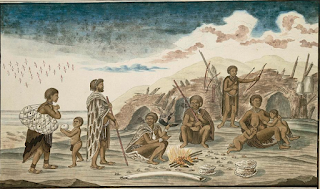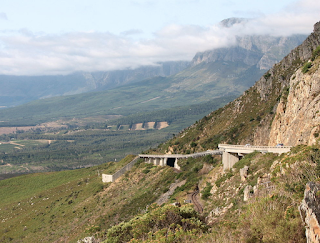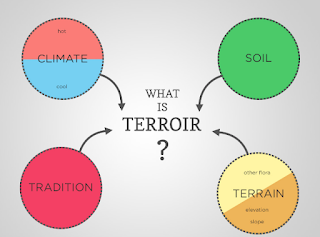The 'Strandlopers' – roamed free along their South African coastline as their lore suggests – existing and depending upon natural availability – plants, herbs, animals and water … they would have been aware of the weather conditions …
 |
| Strandlopers - to be found in the Rijks Museum, Amsterdam |
… those early days – the oceans were only known by the effect of the winds … with the celestial knowledge … as indigenous peoples in all countries of the world have their lore …
The Dutch came first to establish a maritime and trading base at Cape Town for the long journey to the far east – a victualling station for passing ships …
 |
| Very early Cape Town |
… in 1652 the early settlers immediately established a vegetable garden for their own use, as well as for purchase by traders … the gardens had vines and fruit trees for cultivation … especially lemons against scurvy.
Captain Cook travelling via the tip of South America only found New Zealand and Australia in 1769 – 1770 … Ferdinand Magellan, the Portuguese navigator, in 1520 as he rounded South America approached the Antarctic but was beaten back by the ice-floes …
 |
| Gale force winds ... |
European weather lore would have travelled with all explorers and seamen … and they would have learnt to adapt to their new lands.
The success of the gardens was not instantaneous … as the rigorous winter storms destroyed one crop after the other … but the vines thrived – the rootstock coming from Spain, France, Italy, the Netherlands, Brazil …
The Cape area, despite its latitude, had a more European climate – a comfortable one … as the ocean current (the Benguela) cooled the coast down …
Those early pioneers realised that a strong wind often occurred from September to March – this is known as “the South-Easter” …
 |
| A tree bending wind (in England) |
… but because of a local belief that it clears Cape Town of pollution and pestilence it has become known as “the Cape Doctor” …
 |
| Cape Fold belt - greatly influences 'Le Terroir' |
… and has the positive benefit of limiting the risk of various mildew and fungal grape diseases, as well as tempering humidity – as long as the grape vines are protected from the wind strength …
 |
| Climate, Soil, Tradition, Terrain |
Today's understanding of “Le Terroir” (of the earth) scientifically has progressed beyond recognition … yet we need to remember our folklore … realising our forefathers' wisdom …
Gone with the Wind –
but from me 'may Spring come soon!' ...
Tagline – the wind that blows no ills … we could do with more of these winds in our world …
Hilary Melton-Butcher
Positive Letters Inspirational Stories

37 comments:
I wonder if you have read the book "The Covenant" by James Michener? I read it years ago but have never forgotten it. It is a novel about South Africa. As a travel agent, I remember a tour company from Hawaii would send his novel "Hawaii" to those booked on their Hawaiian tours, so his novels must be fairly accurate even though they are fictional.
Your posts are always so informative, Hilary. I learn something new from them every time.
Hari OM
I see KayG has mentioned The Covenant - a wonderful read in my youth; I wonder how it would seem now? No matter... your post, as ever, gives us much to ruminate upon! YAM xx
Hi Hillary. Thank you for this tour of the weather, oceans, the winds and the lores. The tagline is lovely ... the wind that blows no ills. I enjoyed this informative piece.
Sonia
I enjoyed this! Understanding the earth and remembering the lessons we've learned in the past are so very important! Great piece, Hilary!
Excellent post! I loved it. Thanks for researching and sharing.
Once again I leave wiser than I was when I arrived! A really interesting piece, Hilary.
@ Kay - oddly I've never read Michener's South African book - I'll look it up in the library ... his chapter break-downs seem interesting. I lived out there for 14 years ... but am still learning the history ...
So much to learn - but your note about a tour company sending out his novel Hawaii to those booked on their Hawaiian tours ... were lucky travellers ...
@ Janice - thanks so much ... I learnt a little when I was there, but am still learning and have some informative books - thankfully!
@ Yam - yes I noted Kay's recommendation - I'll check it out; it'll be a story, but definitely with an interesting and informative snippets ... thanks for ruminating - so happy to read that ...
@ Sonia - great to see you - yes I'm glad I found the tagline before I wrote the post ... we need plenty of winds blowing no ills ...
@ Jemi - thanks ... it's good one can suggest other aspects to life and relate it back to earlier centuries - that's why I love writing for the WEP prompts ...
@ Elizabeth - also lovely to see you here ... and I'm so happy you enjoyed it and appreciated the simple research I did ...
@ Keith - thanks so much ... I have some good books I can draw on here to bring the WEP prompt to life ... great to see you ...
Cheers to you all - so lovely to have your comments - thanks ... Hilary
Good take on the wind. It's blowing up to 50 mph in Texas - whew - hold on to your hat these days. We have the March wind already blowing like a lion. And it's a cold one! Good writing - thanks
I wonder at how the people learned of these things, and how many things went wrong before they figured it all out. Very interesting.
As always, interesting.
Nancy
May spring come VERY soon!
What a fascinating post. The weather around the world has such interesting quirks sometimes.
Strandlopers. You've introduced me to a new word, Hils.
As always you expand my horizons even as you take the prompt in a direction uniquely your own, Hilary! You know my weakness for all things African, including its history and geography. :) Enjoyed reading and got to know two new words. And I totally love your tagline. Always thought scurvy wasn't linked to citrus fruits till well into the 18th century though...
Yes!! The Dutch arrived specifically to establish a trading centre at Cape Town for the long ship journeys to the far east. But it turned into one of the finest cities on the African continent. When my sons did Matriculation in Melbourne, a third of the 120 students in each of their years were South African, largely Cape Town which they had loved.
The wind that blows no ills. I like that. At sea, the wind can cause devastating havoac. Beautiful take on the prompt.
@ Joanne - oh dear ... winds can be really dangerous - we have a storm over northern Scotland and the Shetlands at the moment ... and yes our proverbs for the weather. As long as its March ... we might get a frigid cold patch next week ... but it goes out with a lamb: let's hope we have a quiet weather year ahead. Texas has had some odd weather recently ...
@ Liz - oral tradition and people who watched and learnt over the years ...
@ Nancy - thank you ...
@ Anabel - oh gosh I do wish Spring would come soon - but I don't want to rush my life away.
@ Olga - yes we never quite know what's happening with the weather ...
@ Sandra - 'strandlopers' - beach walkers ... it's a good description isn't it.
@ Nila - I know you love all things African - it'd be fun to swap stories sometime ... but the Cape Doctor called me ... as definitely Africa remains in my blood somewhere! I have to say I was happy with my tag line - no shame in my promotion of it?!
Scurvy was known for centuries ... as my post on 'concrete lemon' (Sept 2022) described; sailors particularly suffered as citrus fruits would go off - so planting lemon trees at victualling stations made sense - hence the reference to the Cape Town stop off point.
@ Hels - yes it's a stunning place - most people who lived in the Cape area will always remember it - but yet locals wanted to escape from the politics - so can understand South Africans taking the opportunity to study in Melbourne ... lucky kids!
@ Donna - 'the wind that blows no ills' - I'm pleased I worked that tag line out - blowing my own trumpet somewhat?! Winds can be devastating ...
Thanks everyone for coming over and commenting - am happy you enjoyed the read - cheers Hilary
The Strandlopers look like an interesting group. I think I'll try to find out more about them.
Incidentally, I always thought Le Terroir was something to do with wine-making but I suppose 'of the earth' makes sense!
CLICK HERE for Bazza’s inwardly incandescent Blog ‘To Discover Ice’
I think of the pioneers in my United States and how they traveled from one end of our continent to the other without maps - how did they do it? It's always a source of amazement. Definitely they had skills that have been lost with time, and with generations that now can't go anywhere without consulting an app on their phones. I learned so little about South Africa in school. Alana ramblinwitham.blogspot.com
Fascinating, Hilary. Thanks for building on my scant knowledge of African history. I love the way you use the prompts to take us on a journey unique to you.
And I read 'The Covenant' when I was a teenager. Must re-read in this context. I love James A Michener's historical fiction.
Michener's Alaska is another great book. Love the journey you took us on today.
Sorry I wasn't available the other day, but glad you found the solution. Busy, busy week. Happy February!
@ Bazza - I wonder how much you'd find out about them - I was pleased to find the art work. I wasn't sure about Le Terroir ... but was interested it related 'to the earth' ... I also saw it used for hops in Belgium - but I'm sure today it's very relevant: science of nature has improved so much, and been more accepted, though still so much to learn.
@ Alana - understanding the landscape, the contours, the different trees etc - are just not taken on board today. I still drive without satnav ... and use my little grey cells (I think!). There's so much our brain ignores now - because we can switch on a screen ...
Also our education leaves much to be desired ... I've learnt more blogging - after having spent years in South Africa, and spent time in Europe and very briefly in Eastern Europe, then the year in Canada - but never a visit to Asia and Oceania ... I'm sill learning. I need to learn more about Africa ... and other things too - our world is unique ...
@ Denise - my knowledge isn't great but finding out about the 'Cape Doctor' sent me to my second home of southern Africa ... and thus 'easy' to write up a WEP entry ... I'm happy you enjoyed it ... and interesting you've read the Covenant - I'd better get it out and give it a read - I liked the way his chapters were set out.
@ Renee - I know Michener's novels are good reads - good overviews. No worries re being busy - I'd been completely dumb - once I realised what was what!!
Thanks to WEP organisers and administrators ... and have loved the entries so far and will check out any new entries in the next few days ... cheers Hilary
Hi Hilary,
I so agree. We could use more winds that bring no ill-will to others. Especially in the times, we are living in now.
Shalom shalom
We certainly could use more winds that clear out the bad and bring no ills. I always enjoy your posts, Hilary. This was so much more fun to read than those boring stories in elementary school about the explorers. Thanks!
Fascinating about the South-Easter.
Have a creative weekend, Hils.
Weather is such a big factor and it's so unpredictable. Thankfully, persistence usually pays off.
@ Pat - yes Pat - that's why I thought I'd mention that we need bring no ill to others ... thanks ...
@ Dan - wouldn't it be lovely if we had no crises or ruthless leaders curtailing their peoples from free thought. Great - happy to read my posts make 'life-learning' lighter - thanks.
@ Sandra - I was pleased to find out about the 'south-easter', which colloquially is known as 'the Cape Doctor' wind ... thanks for your weekend thoughts ...
@ Rosey - weather is unpredictable ... but as you mention we can usually work round the ill-wind (weather) as it won't cause problems most of the time ...
Thanks so much for your comments - cheers Hilary
I enjoyed this bit of history! Thank you. And, like Sandra, I was struck by the word "strandlopers".
Another fascinating, informative post, Hilary! Thanks for the education. ☺ The Cape Doctor winds sound similar to southern California's Santa Anna winds.
@ Elizabeth - delighted you enjoyed the read ... 'strandlopers' - beach walkers ... the Southern Africans' early indigenous peoples ...
@ Debbie - thanks - good to see you - it's interesting to hear about another wind - the Santa Ana wind originates inland ...
Thanks you two - appreciate your comments - cheers Hilary
Great information made more interesting by the images.
Thanks Sally - I enjoy adding in the images ... they seem to bring the posts to light - as you note. Cheers - good to see you - Hilary
beautiful analogy to South Africa and its tumultuous history. Thank you Hilary. May the skies be clement to you this week.
Great post, Hilary! I can't believe I missed the WEP, I've fallen behind on commenting again. I've always been fascinated by different winds and their nicknames. One of the ones here is called "bise", it's an icy wind that cuts straight down from the Alps!
@ Susan - thanks for your comment - apologies I've only just come across it. The history and the development of South Africa is very interesting ... oh we're still in grey skies - I too look forward to warmer days and blue skies!
@ Deniz - thanks ... look you're very busy - with work, family et al ... I'm not surprised you don't get round everywhere ...
Your 'bise' wind sounds very unpleasant - and bearing in mind our present weather I'd rather it stayed with you!!!
Cheers to you both - thanks - Hilary
Post a Comment